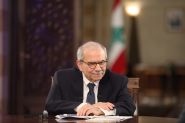
Nadine Labaki, in her eponymous film, found the answer while we are still struggling. Suppose, which is possible, that the situation does not improve for a while, with a gradual disappearance of the state and its services, a government handicapped without a president, and a Hezbollah that is malfunctioning and proliferating. What should be done then?
Diplomatically, we are stagnating. These envoys, led by Jean-Yves Le Drian, seem to have lost hope for the upcoming election of a president. Sufficiently discouraged to focus, more modestly, on the command of the Army. After the Army, their objective might decline even further to, let's say, municipal elections. Then, gradually, we might end up being content with just replacing the mukhtar of Kfarchouba, under the pretext that he is sending belligerent signals at the border.
Meanwhile, the traitors of the state have already admitted that decisions are made elsewhere, which is another signal that the state is fading away. Strangely, some still believe in its resurrection, which can be divided into three categories: the first includes groups (unions, associations, etc.) that will make claims to this or that minister, who promise everything you want "within the limits of our capabilities."
The second, including the same or other types, like boot-lickers, who will just make courtesy visits: "It might be useful someday, you never know." In the third category, again, groups, NGOs, individuals, or companies that donate to this or that ministry, department, or embassy, trying to pull them out of a coma. There are about ten such donations every week, as seen in the Official Journal of the Lebanese Republic.
To deceive all these naive people, ministers and other officials pretend to exist, like holograms. One wants to trace the route of every suppository, from the port to the patient, for some unknown reason, while most of these same patients do not have the means to treat themselves — an aspect that interests the minister much less.
Another brags every other day that he is subsidizing bread, thanks to a loan from the World Bank — which you will have to repay yourselves, plus interest. A third one made a mistake by offering millions of dollars in international aid to civil servants instead of teachers, their initial recipients, putting the school year in jeopardy.
We could multiply examples, but we have other things to do: find practical solutions. However, the only partially feasible one is to create territorial entities that self-govern informally. There are already murmurs criticizing this 'latent partition'.
As a historical reminder, such initiatives were common during the war, with everywhere 'local administrations' taking over public services. Bachir Gemayel even set up a group of specialists called the 'Gamma group,' who were supposed to consider possible survival options, including in a 'Christian stronghold', while the rest of the country was durably occupied by Syrians, Palestinians, and Israelis.
The idea may not be so far-fetched. Currently, decentralized, but rather disorganized, initiatives are moving in this direction. Civil society, with dozens or hundreds of wealthy individuals and NGOs, are active in their respective geographical areas to compensate for the absence of the state: public lighting, roads and sidewalks, health, education, green spaces, transportation, social and professional assistance, microcredit, recycling, etc. After the port explosion, the state shone by its absence, and it was private initiatives that allowed a certain recovery.
On a broader spectrum, there was an economic recovery for a year (before the war in Gaza... and the south), but this growth was not uniform. With the naked eye, one can see that relative prosperity has touched cities like Achrafieh, Jbeil, or Batroun much more than Tripoli, Saida, Nabatieh, or even Jounieh, thanks to private initiatives. Municipalities sometimes play a role, even if they are broke, by attracting private players when the mayor is credible.
The Shiite tandem unquestionably controls its territories but has failed miserably to create any development, favoring illegal activities that enrich its fans and plunge the rest into poverty.
To support such efforts, a first step is for foreign and local donors to stop betting on the state once and for all, in favor of civil society and reliable municipalities. We have seen what happened with the 50 French buses peacefully rusting in sordid warehouses or the American police dogs that we could no longer feed, and being skinny, we had to repatriate them to the USA.
A more advanced step is to create in each city/region a coordination committee between various private stakeholders if we manage to overcome the clash of egos, which would allow better organization of aid.
Another step is to stop paying taxes, as much as possible, to the completely useless central authorities and use this money to meet local needs. Then, gradually move away from charitable assistance and move towards development through job-creating investments, professional assistance, and microcredit. With a microcredit of a few thousand dollars, a small business that supports two or three families can be created.
Now, can we entirely do without the state? Not entirely. "The state is necessary, but whenever we can do without it, I prefer it," and it's President François Mitterrand who says so
Diplomatically, we are stagnating. These envoys, led by Jean-Yves Le Drian, seem to have lost hope for the upcoming election of a president. Sufficiently discouraged to focus, more modestly, on the command of the Army. After the Army, their objective might decline even further to, let's say, municipal elections. Then, gradually, we might end up being content with just replacing the mukhtar of Kfarchouba, under the pretext that he is sending belligerent signals at the border.
Meanwhile, the traitors of the state have already admitted that decisions are made elsewhere, which is another signal that the state is fading away. Strangely, some still believe in its resurrection, which can be divided into three categories: the first includes groups (unions, associations, etc.) that will make claims to this or that minister, who promise everything you want "within the limits of our capabilities."
The second, including the same or other types, like boot-lickers, who will just make courtesy visits: "It might be useful someday, you never know." In the third category, again, groups, NGOs, individuals, or companies that donate to this or that ministry, department, or embassy, trying to pull them out of a coma. There are about ten such donations every week, as seen in the Official Journal of the Lebanese Republic.
To deceive all these naive people, ministers and other officials pretend to exist, like holograms. One wants to trace the route of every suppository, from the port to the patient, for some unknown reason, while most of these same patients do not have the means to treat themselves — an aspect that interests the minister much less.
Another brags every other day that he is subsidizing bread, thanks to a loan from the World Bank — which you will have to repay yourselves, plus interest. A third one made a mistake by offering millions of dollars in international aid to civil servants instead of teachers, their initial recipients, putting the school year in jeopardy.
We could multiply examples, but we have other things to do: find practical solutions. However, the only partially feasible one is to create territorial entities that self-govern informally. There are already murmurs criticizing this 'latent partition'.
As a historical reminder, such initiatives were common during the war, with everywhere 'local administrations' taking over public services. Bachir Gemayel even set up a group of specialists called the 'Gamma group,' who were supposed to consider possible survival options, including in a 'Christian stronghold', while the rest of the country was durably occupied by Syrians, Palestinians, and Israelis.
The idea may not be so far-fetched. Currently, decentralized, but rather disorganized, initiatives are moving in this direction. Civil society, with dozens or hundreds of wealthy individuals and NGOs, are active in their respective geographical areas to compensate for the absence of the state: public lighting, roads and sidewalks, health, education, green spaces, transportation, social and professional assistance, microcredit, recycling, etc. After the port explosion, the state shone by its absence, and it was private initiatives that allowed a certain recovery.
On a broader spectrum, there was an economic recovery for a year (before the war in Gaza... and the south), but this growth was not uniform. With the naked eye, one can see that relative prosperity has touched cities like Achrafieh, Jbeil, or Batroun much more than Tripoli, Saida, Nabatieh, or even Jounieh, thanks to private initiatives. Municipalities sometimes play a role, even if they are broke, by attracting private players when the mayor is credible.
The Shiite tandem unquestionably controls its territories but has failed miserably to create any development, favoring illegal activities that enrich its fans and plunge the rest into poverty.
To support such efforts, a first step is for foreign and local donors to stop betting on the state once and for all, in favor of civil society and reliable municipalities. We have seen what happened with the 50 French buses peacefully rusting in sordid warehouses or the American police dogs that we could no longer feed, and being skinny, we had to repatriate them to the USA.
A more advanced step is to create in each city/region a coordination committee between various private stakeholders if we manage to overcome the clash of egos, which would allow better organization of aid.
Another step is to stop paying taxes, as much as possible, to the completely useless central authorities and use this money to meet local needs. Then, gradually move away from charitable assistance and move towards development through job-creating investments, professional assistance, and microcredit. With a microcredit of a few thousand dollars, a small business that supports two or three families can be created.
Now, can we entirely do without the state? Not entirely. "The state is necessary, but whenever we can do without it, I prefer it," and it's President François Mitterrand who says so
Read more




Comments